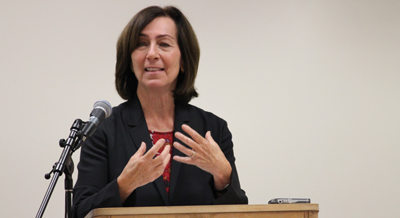Inequality is the word of the moment. You can’t go anywhere without hearing it thrown around. Usually, this word evokes images of the discrepancy between rich and poor.
Some might think this topic is divorced from campaign finance regulations, which, as far as civil enforcement is concerned, are the jurisdiction of the Federal Election Commission (FEC), a body of regulators appointed to implement the laws that Congress passes as well as to write rules and advise speakers as to how those laws will be enforced.
Enter Ann Ravel. The current Chair of the FEC recently made the argument that women are underrepresented because of spending by Super PACs. In a recent keynote speech at a conference organized by several pro-regulation groups, Ravel stated that “Over 90 percent of Super PACs are funded by white males, and they generally have been found to contribute to white males.”
With the head of the FEC leveling such an accusation, some would be inclined to wonder if there is a huge systemic problem in our election system. Those who know better would say there is a problem with the laws currently governing our campaigns.
The latter group would be right, but not for the reasons Ms. Ravel thinks. CCP has long encouraged making the political system more open and more accessible to all Americans. In comments to the FEC on its May forum on women in politics, CCP President David Keating expressed many of the same concerns that appear to motivate Ravel’s recent comments. Where we disagree with the Chair is in how best to promote greater participation in politics.
Keating’s comments explain how the very laws that are claimed to help prevent corruption end up encouraging it, and serve only the interests of a narrow few. These laws have a simple purpose: to ensure re-election for incumbent politicians. Low contribution limits and burdensome disclosure requirements, especially on non-primarily political groups, serve to knock down or prevent upstart challengers and new candidates from competing or mounting a legitimate electoral challenge. These laws create a barrier to entry not only for women, but for all would-be candidates. Keating further notes that taxpayer-financed campaign systems, like those in Arizona and Maine, fail to increase the number of women elected to public office.
It is also worth mentioning that the current Congress – elected by voters who benefitted from the speech of Super PACs – has the highest proportion of women in our country’s history. To claim that deregulated campaigns are harming women requires more than simply pointing to Super PAC donors who are men, or who give to men.
The real reform that is needed is not to limit the ability of individuals to support the candidates and causes of their choice, but for the FEC to understand the impediments current regulations create for entry-level candidates. Indexing certain registration and reporting thresholds (many of which remain unchanged since the 1970s) in the Federal Election Campaign Act to inflation, which the FEC has unanimously recommended to Congress, simplifying and modernizing complicated forms (as the Commission has been petitioned to do by a bipartisan group of seven prominent campaign finance lawyers, including CCP Chairman Brad Smith and Legal Director Allen Dickerson), and clarifying existing questions about draft committees, which can be instrumental in encouraging women to run for office, would be a great start.
In any event, one can hope the Commission will be sensitive to the impact of its regulations on new and upstart candidates, but rhetoric like Ms. Ravel’s doesn’t leave us especially optimistic.














